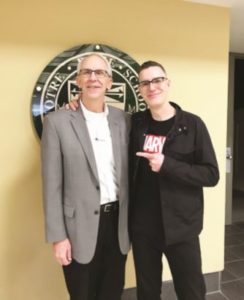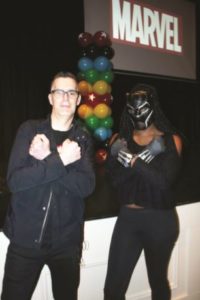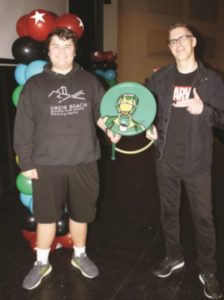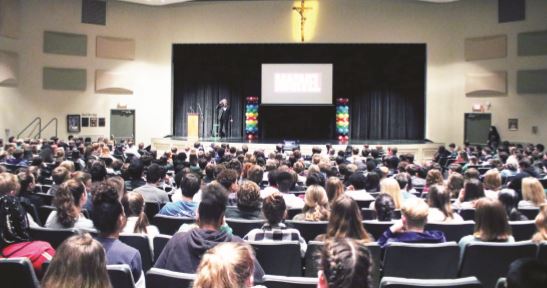Catholic values reflected through the work of game giant’s executive, who is a Notre Dame High School grad
By Alyssa Neuhoff
Bill Rosemann sat in the teacher’s lounge at Notre Dame High School in Chattanooga on Jan. 31 after speaking to an assembly of students and teachers as well as alumni and other members of the Catholic community and mused about the classic Marvel Comics saying, “with great power there must also come great responsibility.”
Mr. Rosemann expounded that “sometimes people shorten it and say with great power comes great responsibility, which is not true. The lesson is that it’s a choice. When you get power, you must choose to use it wisely.”

Notre Dame High School president George Valadie welcomed fellow alumnus and Marvel Games executive Bill Rosemann back to campus on Jan. 31.
The Marvel Games executive and local favorite had just finished an hour-long speech encouraging and inspiring the students to use the excellent Catholic education they are receiving to follow their dreams.
“Go for it; whatever you want to do go for it. Someone has to do it; why not you? It could be you,” said Mr. Rosemann, who spent the rest of the day interacting with students and teaching creative writing workshops.
Mr. Rosemann is an alumnus of Notre Dame, class of ’89, having gone to Our Lady of Perpetual Help School before that. His time at these schools provided him with a strong support system.
“Going to OLPH and Notre Dame, the teachers, the parents, everyone really cared about the students, and then, as the students, our responsibility was to be good to one another,” he said, noting that he was taught the power and influence that teachers and parents and other students can have. He urged the students to appreciate having that influence.
The religion classes, an added bonus to the usual set of classes, also shaped the critical thinking skills Mr. Rosemann uses now as part of his job: analyzing concepts of sacrifice, redemption, forgiveness, and kindness.
“All those very simple but powerful ideas are lessons that stay with you well,” he said. “The other thing I really enjoyed in Catholic school was we were always taught about being inclusive and always remembering that’s the way to be. You welcome everybody. You don’t judge based on your background, what they look like.”
The lessons Mr. Rosemann learned though his Catholic high school experience influence and accompany inclusivity and other important themes that Marvel displays in all of its products.
He credited the “whole Catholic school experience” for providing him with everything he needed in life, both academically and morally.
“I remember sitting out there, in those seats, looking up — we were talking about graduating — wondering what I wanted to do. I eventually realized I wanted to tell stories with the Marvel characters,” Mr. Rosemann told the students.

Bill Rosemann is partnered with Notre Dame High School junior Kaitlyn Leath, who is portraying one of the many Marvel superheroes. Mr. Rosemann spoke to students about his time at Our Lady of Perpetual Help School and Notre Dame.
This revelation came while a fire was burning down the apartment building where he and his mother were living. The last irreplaceable item that Mr. Rosemann saved was the box of comics in his bedroom closet. He described the many ways these comics had impacted his life.
“Wherever we moved as a kid or whatever was happening when I was getting bullied, picked on, going through [my parent’s] divorce, comics were there for me. I would escape the real world and go into this marvel,” he recalled.
In high school, he “did the whole nine yards.” This included writing for the school newspaper, acting in plays, having a role in student government, and playing football, as well as being an altar server and going on Catholic retreats like Search.
“I was able to do all these things and do well academically. I always felt those things shouldn’t be separated,” he said, explaining that being successful in both areas ultimately aided him in his acceptance to the University of Notre Dame, where he majored in English literature.
He continued to write and be published at Notre Dame University, even creating the first student-produced comic book at the university. During spring break one year, he submitted his resume to an assistant editor at Marvel. He was offered an opportunity to do some freelance writing for Marvel Age magazine.
Mr. Rosemann has now worked at Marvel for 21 years, filling positions like editor and public relations positions, and is now vice president and head of creative at Marvel Games. He brings together all the studios to ensure that the story they’re telling is interesting, new, and has a valuable message behind it. The team also decides on characters, costumes, themes, and storylines, or as he put it, “how to celebrate each character.”
Mr. Rosemann ensures that every game is “authentically Marvel,” or in other words he makes sure all the pieces of the final product fit together and tell a story.
He remembers his old friend’s insight when creating media.
“Stan Lee always said every comic could be someone’s first comic. We apply that to everything. Every game we make we pretend it’s someone’s first and they don’t know who the character is. Does everything make sense? We always say there should be mystery but there shouldn’t be confusion,” Mr. Rosemann said, referring to Mr. Lee, the legendary creator of some of Marvel’s most popular superheroes, like Spider-Man, the X-Men, Iron Man, Thor, the Hulk, Black Widow, the Fantastic Four, and Black Panther.
“We believe in putting the human in the superhuman,” Mr. Rosemann mused.
The backstory is very important at Marvel, according to Mr. Rosemann. Its aim is to answer questions to give their characters a sense of realness: who were the heroes and villains before, when they were only civilians? What motivates the characters? How do they handle their special powers now?
“They may be superheroes, but never forget that they’re human characters. They have problems, face challenges, and try to overcome them,” Mr. Rosemann said of the Marvel characters. “When we create these fictional stories, my theory is they actually change real lives and then we creators see what people do and it inspires us and it creates this circle.”
Mr. Rosemann’s favorite character, Spider-Man, embodies this and originally inspired his love of comics.

Mr. Rosemann is shown with Notre Dame junior Drew Beach and the Iron Man stool Drew painted for the art room.
“In kindergarten, I saw a Spider-Man cartoon, and in the cartoon he waved to the camera and it felt like he was waving to me. He was young, he was kind of like me, and he was not perfect. He wasn’t a rich billionaire; he wasn’t an alien from another world; he was a kid from Queens. He was struggling with his studies, with fitting in, with his job, and then trying to be a superhero on top of that. That was very revolutionary for superheroes at the time,” the NDHS alum observed.
These character flaws are what creates a connection between the audience and the character. Mr. Rosemann shared that while these characteristics are now expected and necessary, they were not used at the time. Marvel changed the way stories were told in that sense.
Another revolution in media that Marvel displays is the diverse and inclusive nature of their comics, films, and games.
“Marvel reflects the world around us and then put on that layer of sci-fi. Representation is so important. People should be able to see themselves in the pop culture that they consume. That makes people feel validated. It inspires them,” Mr. Rosemann explained. “We need all sorts of stories with all sorts of heroes that look like us, that act like us, that have our background, who feel different like us; we need heroes like that.”
The impact of successful representation can be seen in the heartwarming story of Mr. Rosemann’s interaction with the mother of a young boy who had a hearing disability. Mr. Rosemann created Blue Ear and Sapheara, two hearing-impaired heroes alongside an older favorite, Hawkeye, who wore Stark Industries hearing aids in a comic.
By creating these characters, he was able to validate that anyone can be a hero and celebrate all ways of living.
“We don’t focus on our differences; we focus on what unites us,” he said.
Mr. Rosemann is living his dream job and now enjoys inspiring young people to work toward their own dreams. His vibrant energy and enthusiasm for the job is evident in all that he says.
His speeches also promote inclusion, kindness, and acting morally. Part of Mr. Rosemann’s message stressed that not everyone has to be the lead actor, the director, or the writer. He noted the many other roles that are equally important in creating successful media masterpieces like Marvel does.
He encouraged students to “take advantage of the school you go to. Take advantage of technology. Figure out what’s out there. Try really hard. You have to take advantage of those experiences.”
Mr. Rosemann wanted to create more of the stories and art that had impacted his life in order that “kids, when they find those stories, they’re inspired to take the lessons and apply them to their real, everyday lives.”
Just like the Marvel characters, “you don’t always feel OK.
“It’s OK to not feel OK. It’s OK to have challenges. It’s OK to have secrets. It’s OK to feel guilty. Be the authentic you. Be proud that you like what you like. Embrace what’s important to you. Be good to one another. That’s how you can be a hero,” he told the assembly at Notre Dame. “That’s the power of Marvel; it brings us all together.”

